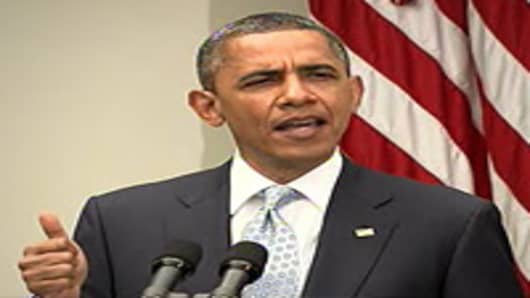President Obama's proposal to clamp down on oil speculation would give the federal government a direct role in how energy markets function and could actually make prices more volatile, analysts say.
The president, under pressure from rising gasoline prices, announced a $52 million plan Tuesday to strengthen federal supervision of oil markets, including forcing traders to put up more money when they bet on the direction of oil prices.
This so-called margin requirement is intended to limit the amount of speculation in the market, which Democrats and others blame and say is partially behind the rise in oil and gasoline prices.
Obama's plan would dramatically increase the role of the Commodity Futures Trading Commission (CFTC) in regulating US oil markets.
The new rules would allow the CFTC to direct oil exchanges to raise margins in order to address volatility or prevent excessive speculation or manipulation. Currently, margins are set by exchanges in response to changing volatility of the underlying commodity only.
Tuesday’s announcement reflects the idea that margined trading gives too much power to financial investors, says Kevin Book, Managing Director at Clearview Energy Partners.
“It does not appear to recognize the tendency for funds of limited size to move their interest from futures to derivatives when margin requirements tighten and/or commodity prices rise, but it could have the effect of briefly blunting short-term speculative impacts.”
For one group, however, Obama's proposal doesn’t go far enough.
“Wall Street pours hundreds of billions of dollars into the commodity markets every month to speculate and that is causing prices to jump,” Dennis Kelleher, president of Better Markets, a non-profit group that lobbies for more financial regulation, told CNBC.com in an email. “Until Wall Street index fund speculation is stopped, no one is being serious about stopping rising oil and gas prices.”
The role of speculators on market prices has been an ongoing debate in the United States and abroad.
"There is always a focus on gasoline prices and oil market manipulation this time of year, but these are the same energy traders that just knocked natural gas prices to 10 year lows," says gasoline trader Anthony Grisanti, President of GRZ Energy.
"By raising margins prices could be more volatile," adds Grisanti. The common view among professional investors is that higher margins leads to less liquidity which in turn, could create more volatility.
This move is in direct reaction to rising oil prices and its negative impact on consumers. Hawaii, President Obama’s home state has the highest gasoline prices in the nation and recently hit a record high of $4.618 per gallon.
Tuesday’s initiative also seeks to increase access to data currently collected by the CFTC but, not freely disseminated because of issues of confidentiality.
The other points outlined in the press release include increased funding for the CFTC to oversee the markets by putting “more cops on the beat” and making upgrades to IT technology for market surveillance. In addition, the plan seeks to increase both civil and criminal penalties for “manipulation in key energy markets”.
Correction: This article had formerly linked to a report that put the cost of President Obama's proposal at $52 billion — the correct number is $52 million.
Follow me on twitter @LoriSpechler and read more of my posts on http://marketinsider.cnbc.com




